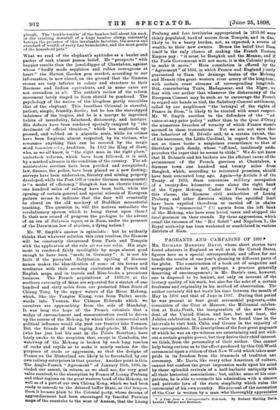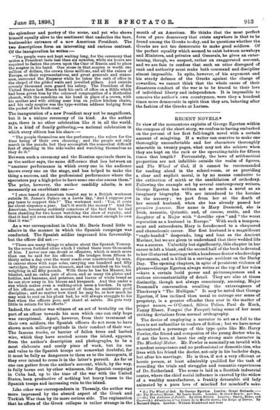PAGEANTS AND CAMPAIGNS OF 1897.*
Mn. RICHARD HARDING DAVIS, whose short stories have found admirers in England as well as in the United States, figures here as a special correspondent, and offers for our benefit the results of one year's gleaning in different parts of the globe. The construction of a book out of magazine and newspaper articles is not, perhaps, a practice generally deserving of encouragement ; in Mr. Davis's case, however, one is disposed to be lenient, not only on account of the literary quality of his work, but also for the sake of a certain freshness and originality in his method of observation. The author certainly did not waste his time between the month of May in 1896 and that of June in 1S97. During that period he was present at four great ceremonial pageants,—the coronation of the Czar at Moscow, the Millennial celebra- tion at Buda-Pesth, the inauguration of the new Presi- dent of the United States, and last, but not least, the Jubilee celebration in London ; while he found time in the intervals to visit both Cuba and Greece in the capacity of war correspondent. His descriptions of the four great pageants of which he was an eye-witness are entertaining and not with- out a certain graphic power, but they derive their chief interest, we think, from the personality of their author. One cannot help being curious as to the effect prodaced by this Old-World ceremonial upon a citizen of that New World which takes somf pride in its freedom from the trammels of tradition ana ceremony. Mr. Davis, like every other American of culture, cannot but confess the great impression made upon his mind by these splendid revivals of a half-barbaric antiquity with all their historical associations ; but, unlike some of his com- patriots, he is able to reconcile his admiration with a sincere and patriotic love of the stern simplicity which rules the ceremonial of his own country. His account of the coronation of the Czar is written by a man who thoroughly appreciates • A Year from a Corr.spoldent's Nut-book. By Richard Harding DAY111. London: Harper and Brothers,
the splendour and poetry of the scene, and yet who shows himself equally alive to the sentiment that underlies the bare, businesslike entrance of a new American President. The two descriptions form an interesting and curious contrast. Of the inauguration he writes :-
"The people were not kept waiting long, for the ceremony that makes a President lasts less than six minutes, while six hours are required to fasten the crown upon the Czar of Russia and to place the sceptre in his hand. One stone in that sceptre is worth one million of dollars, the crown three millions, and all the rulers of Europe, or their representatives, and great generals and states- men, surround the Emperor while he takes the oath of office in the chapel of the gilded walls and jewelled pillars. And outside seventy thousand men guard his safety. The President of the
United States last March took his oath of office on a Bible which had been given him by the coloured congregation of a Methodist church, with the sunshine on his head in place of a crown, with his mother and wife sitting near him on yellow kitchen chairs, and his only sceptre was the type-written address bulging from the pocket of his frock-coat."
The inauguration of a new President may not be magnificent, but it is a unique ceremony of its kind. As the author says, there is no other celebration like it in all the world. It is a kind of family gathering,—a national celebration in which every citizen has his share :- " The people themselves are the performers ; the rulers for the time being of their own choosing ; and the people not only march in the parade, but they accomplish the somewhat difficult feat of standing in the side-walks and watching themselves as they do it."
Between such a ceremony and the Russian spectacle there is, as the author says, the same difference that lies between an " amateur performance in which every one in the audience knows every one on the stage, and has helped to make the thing a success, and the professional performance where the spectators pay a high price to have some one else amuse them." The price, however, the author candidly admits, is not necessarily an exorbitant one :— " I once heard an American tourist say to a British workman outside St. James's Palace on a Levee day, And I suppose you pay taxes to support this ' The workman said : Yes, it costs me about sixpence a year. Isn't it worth the money ? ' And the American, becoming suddenly conscious of the fact that he had been standing for two hours watching the show of royalty, and that it had not even cost him sixpence, was honest enough to own that it was."
As a war correspondent in Cuba Mr. Davis found little to admire in the manner in which the Spanish campaign was conducted. The Spanish soldier impressed him favourably, but the officer did not :—
" There are many things to admire about the Spanish Tommy. In the seven fortified cities which I visited there were thousands of him. I never saw one drunk or offensive, which is much more than can be said for his officers. He trudges from fifteen to thirty miles a day over the worst roads ever constructed by man, in canvas shoes with rope soles, carrying one hundred and fifty cartridges, fifty across his stomach, and one hundred on his back, weighing in all fifty pounds. With these he has his Mauser, his blanket, and an extra pair of shoes, and as many tin plates and bottles, and bananas, and potatoes. and loaves of white bread as he can stow away in his blouse and knapsack. And this under a sun which makes even a walking-stick seem a burden. In spite of his officers, and not on account of them, he maintains good discipline; and no matter how tired he may be, or how much he may wish to rest on his plank bed, he will always struggle to his feet when the officers pass, and stand at salute. He gets very little in return for his efforts."
Indeed, the author was witness of an act of brutality on the part of an officer towards his men which one can only hope was exceptional. Apart, however, from their treatment of their own soldiers, the Spanish officers do not seem to have shown much military aptitude in their conduct of their war. The famous trocha, or barrier of fallen trees and barbed wire, which they have erected across the island, appears, from the author's description and photographs, to be a most elaborate and costly piece of work, but its use and value to the Spanish troops are somewhat doubtful, for it must be fully as dangerous to them as to the insurgents, if they ever intend to cross it in the latter's pursuit. As far as one can gather from the author's account, which, by the way, is fully borne out by other witnesses, the Spanish campaign in Cuba had, up to the time of the war with the United States, been productive of nothing but heavy losses to the Spanish troops and increasing ruin to the island.
Like other war correspondents in Thessaly, the author was more impressed by the absurd aspect of the Greek and Turkish War than by its more serious side. The explanation that he offers of the Greek collapse is rather strange in the
month of an American. He thinks that the most perfed form of pure democracy that exists anywhere is that to be found among the Greeks to-day, and he questions whether the Greeks are not too democratic to make good soldiers. Of the perfect equality which seemed to exist between newsboys and Ministers, and privates and Generals, he gives an enter- taining, though, we suspect, rather an exaggerated account, and we are fain to confess that such an utter disregard of rank and authority must make both command and discipline almost impossible. In spite, however, of his argument and his sturdy defence of the Greeks against the charge of cowardice, we cannot think that the whole cause of their disastrous conduct of the war is to be traced to their love of individual liberty and independence. It is impossible to conceive the author's own countrymen, were they a hundred times more democratic in spirit than they are, behaving after the fashion of the Greeks at Larissa.



















































 Previous page
Previous page